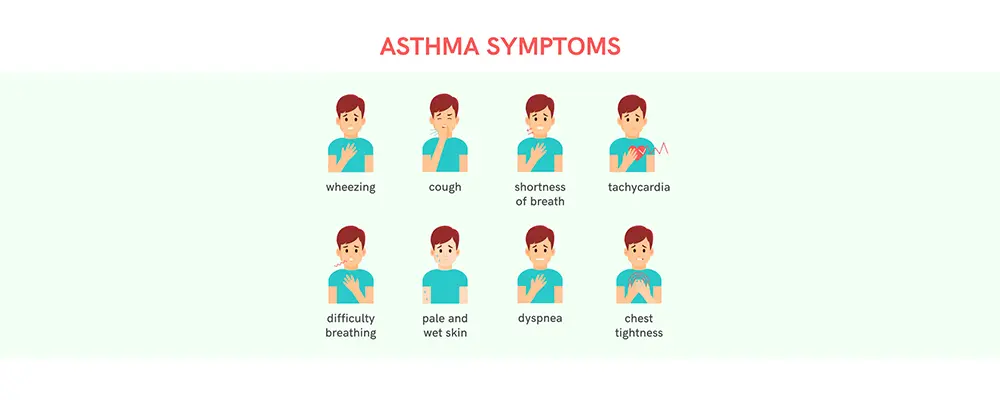Introduction:
Asthma Exacerbation Treatment: Asthma is a chronic respiratory disease that affects the airways. It is one of the most common long-term diseases in children, but it can also affect adults. Asthma causes nighttime or early morning wheezing, shortness of breath, chest tightness, and coughing. You are more likely to have asthma if someone in your immediate family has it.
Atopy, or the genetic proclivity to develop the allergic disease, can play a significant role in the development of allergic asthma. However, allergic asthma is not the only type of asthma. Exposure to environmental factors such as mold or dampness, allergens such as dust mites, and secondhand tobacco smoke have all been linked to the development of asthma. Asthma can also be caused by air pollution and viral infections.
It can be difficult to tell if someone has an asthma exacerbation or just coughing, especially in children. Having an experienced physician or Pulmonologist examine your lungs and look for allergies can help determine if you have asthma and help with establishing an Asthma Exacerbation Treatment plan.
What are the Types of Asthma?
Asthma is classified based on the cause and severity of symptoms. Asthma is defined by healthcare providers as:
Intermittent Asthma:
This type of asthma comes and goes, allowing you to feel normal in between asthma exacerbations.
Persistent Asthma:
This means that you have symptoms almost all of the time. Symptoms can range from mild to severe. The frequency with which you experience symptoms determines the severity of your asthma. Doctors also consider how well you can perform tasks during an exacerbation.
There are also the following types of asthma:
Exercise-induced Asthma:
Also known as exercise-induced bronchospasm, it is caused by physical activity.

Occupational Asthma:
This type of asthma affects people who work with irritating substances.
ACOS (Asthma-COPD Overlap Syndrome):
It occurs when you have both asthma and chronic obstructive pulmonary disease (COPD). Both diseases make breathing difficult.
Who can get Asthma?
Asthma can strike anyone at any age. Asthma is more likely to develop in people who have allergies or who have been exposed to tobacco smoke. This includes both secondhand (exposure to someone else who is smoking) and thirdhand smoke (exposure to clothing or surfaces in places where someone has smoked).
According to statistics, females are more prone to developing asthma than males. African Americans are more likely than other races to suffer from asthma.
Asthma in Children:
Asthma is one of the most common chronic conditions. It can occur at any age, but children are slightly more likely than adults to develop it. The American Lung Association (ALA) lists the following as common childhood asthma triggers:
- Colds and respiratory infections
- Cigarette smoke, including secondhand tobacco smoke
- Indoor allergens and outdoor air pollutants such as ozone and particle pollution
- Exposure to cold air
- Sudden temperature changes
- Stress
- Exercise
If a child develops asthma, it is critical to seek medical attention because it can be fatal. A doctor can advise you on the best ways to deal with the condition through asthma exacerbation treatment and management options.
Asthma may improve in some children as they grow older. However, for many people, it is a lifelong condition.
What is the Link between Asthma and Sinusitis?
Asthma is frequently associated with rhinosinusitis (“sinusitis”), which causes pain, pressure, and congestion in the sinus cavities. While it is possible to have both inflammatory conditions at the same time, it is difficult to find the connection between the two.
Asthma is not caused by sinusitis. However, sinusitis has the potential to exacerbate the symptoms of this lung disease. If you do have asthma or allergic rhinitis, you may be more likely to develop chronic sinusitis. Both conditions cause inflammation, which can cause problems with the airways and sinuses.
While the exact links are unknown, there are potential management options through sinusitis and asthma exacerbation treatment, to reduce nasal congestion and related symptoms, which can also help reduce breathing issues. Revival Research is conducting Asthma Clinical Research in Michigan to help people with asthma exacerbation and potentially help reduce its impact on the lungs.
What is an Asthma Exacerbation?
Coughing, chest tightness, wheezing, and difficulty breathing are all symptoms of an asthma exacerbation. Asthma affects your body’s airways, which are the pathways that transport air to your lungs. As air passes through your lungs, the airways shrink, much like the branches of a tree are smaller than the trunk. During an asthma exacerbation, the sides of your lungs’ airways swell and the airways shrink. Less air enters and exits your lungs, and mucous produced by your body clogs the airways.
What are the Symptoms of an Asthma Exacerbation?
Asthma is characterized by bronchial tube inflammation and extra sticky secretions within the tubes. Asthmatics experience symptoms when their airways tighten, inflame, or fill with mucus.
Asthma exacerbation manifests itself in three ways:
Airway obstruction:
When you breathe normally, the muscle bands around your airways relax, allowing air to flow freely. When you have asthma, however, your muscles tighten. It is more difficult for air to pass through.
Inflammation:
Asthma causes the bronchial tubes in your lungs to become red and swollen. This inflammation has the potential to harm your lungs. Treating this is critical to long-term asthma management.
Irritation of the airways:
Asthmatics have sensitive airways that tend to overreact and narrow when even minor triggers are present.

These issues may result in symptoms such as:
- Coughing, particularly at night or early in the morning,
- A whistling sound when you breathe,
- Breathing difficulty,
- Chest tightness, pain, or pressure, and
- Sleeping difficulties as a result of shortness of breath.
Not everyone with asthma experiences the same symptoms in the same way. You may not experience all of these symptoms at the same time, or you may experience different symptoms at different times. Your symptoms may also differ from one asthma exacerbation to the next, being mild one time and severe the next.
Some people with asthma may go for long periods without experiencing symptoms. Others may face difficulties daily. Furthermore, some people develop asthma only when they exercise or have viral infections such as colds. Depending on the severity of your Asthma and its symptoms, your doctor may suggest asthma exacerbation treatment and management options to help curb the symptoms.
What are the other Causes/Triggers of Asthma Exacerbation?
Even though asthma is more common in children, many people do not develop asthma until they are adults. There is no single cause of asthma. Researchers believe it is caused by a combination of factors.
These elements are as follows:
Genetics:
You are more likely to develop asthma if a parent or sibling has it.
History of viral infection:
People who had severe viral infections as children, such as Respiratory Syncytial Virus Infection (RSV), may be predisposed to the condition.
Hygiene Hypothesis:
According to the Hygiene Hypothesis, when babies are not exposed to enough bacteria in their early months and years, their immune systems do not develop sufficiently to combat asthma and other allergic conditions.
Many other factors can also aggravate asthma symptoms. Asthma triggers can vary, and some people are more sensitive to certain triggers than others. The following are some of the most common triggers:
- Respiratory infections,
- Allergens and environmental irritants,
- Intense feelings,
- Unusual weather conditions,
- Pests, and
- Certain drugs, such as Aspirin or Nonsteroidal Anti-inflammatory Drugs (NSAIDs).
How Long Does Asthma Last?
Asthma is a long-term condition for many people, especially if it develops as an adult. It sometimes goes away or improves in children during their adolescence, but it can reappear later in life.
Asthma Exacerbation Treatment is usually effective in controlling asthma symptoms. Most people will lead normal, active lives, though some people with severe asthma may continue to have problems.
When Should You See A Doctor?

If you are experiencing any of the following serious symptoms, seek medical attention immediately and receive asthma exacerbation treatment.
- Rapid breathing.
- Face, lips, or fingernails that are pale or blue.
- When you breathe in, the skin around your ribs pulls inward.
- Difficulty in breathing, walking and talking.
- Symptoms that do not improve even after using your inhaler.
What are the Asthma Exacerbation Treatment Options?
Asthma exacerbation treatment options are expanding and improving. The treatment’s goal is to:
- Assist a person in breathing more easily
- Reduce the number of asthma exacerbations
- Help them live their lives to the fullest
Asthma exacerbation treatment options include the following:
Quick Relief Asthma Medications:
Only use these medications in the event of asthma exacerbation or symptoms. They provide immediate relief, allowing you to breathe again.
Bronchodilators:
Bronchodilators work quickly to relax the tightened muscles around your airways and reduce symptoms.
Bronchodilators can be taken orally or intravenously, but they are most commonly taken with an inhaler (rescue) or nebulizer. They can be used to treat acute asthma symptoms or to prevent a flare-up before exercise.
First Aid Asthma Treatment:
If you suspect a loved one is having an asthma attack, tell them to sit up straight and help them use their rescue inhaler or nebulizer.
The dosage varies according to the medication. Check the instructions insert to ensure you understand how many pumps of the inhaler you will require in the event of an exacerbation. Seek emergency medical attention if symptoms persist for more than 20 minutes and the second round of medication does not help.
Ask your doctor about another type of medication for long-term asthma control if you frequently need to use quick-relief medications.
Long-Term Asthma Medications:
These medications are taken daily to help reduce the number and severity of your asthma symptoms, but they are not the recommended asthma exacerbation treatment.
Among the long-term asthma medications are:
Anti-inflammatories:
Corticosteroids and other anti-inflammatory medications, when inhaled, help reduce swelling and mucus production in your airways, making it easier to breathe.
Anticholinergics:
These assist in keeping your muscles from tightening around your airways. They are typically taken daily in conjunction with anti-inflammatories.
Bronchodilators:
These work slowly. These should be used only in conjunction with anti-inflammatory asthma medications.
What Complications can an Asthma Exacerbation Cause?
Asthma, if not controlled, can cause problems in your daily life, such as:
- Fatigue,
- Weight gain due to a lack of exercise,
- ER or hospital visits,
- Time away from school or difficulty focusing on schoolwork, and
- Stress, anxiety, and depression are all examples of mental health issues.
Asthma can also cause serious medical conditions such as:
- Pneumonia and other complications associated with common infections such as the flu,
- Pregnancy loss or premature birth,
- Bronchial tubes in your lungs have become permanently narrowed, and
- Lung failure.
How can we Prevent Asthma Exacerbation?
Your action plan will include various methods for controlling your asthma and preventing attacks. These could include:
- Recognize your triggers and avoid them.
- Take your Asthma exacerbation treatment and medications according to your doctor’s instructions. Inform them if you notice yourself using a quick-relief inhaler more frequently.
- Keep track of your condition and become familiar with the warning signs that may be deteriorating your overall health. A peak flow meter can be useful.
- Know what to do if you believe your asthma is worsening.
Consult your doctor about vaccines to reduce your risk of certain conditions. You may be immunized against flu, pneumonia, shingles, or whooping cough (Pertussis).
Takeaway:
Asthma is a chronic lung condition that causes inflammation and makes breathing difficult. It can affect both adults and children in various ways and to varying degrees of severity. Asthma can be treated with a variety of medications, which can be used either short-term to treat asthma exacerbation or long-term to manage symptoms over time.
Lifestyle changes may also help reduce asthma exacerbations. This can include changes to one’s diet, exercise, or stress management. Consult your doctor to determine the type of asthma you have and the best asthma exacerbation treatment and management options for you. There are Multiple Asthma Clinical Research in Michigan, near you that aim to assist people who have Asthma or are unable to manage their symptoms. Following treatment plans can be beneficial.




